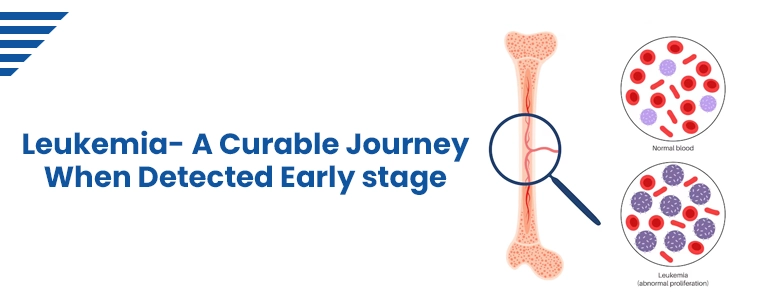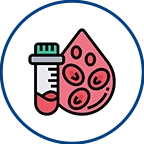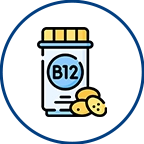Leukemia- A Curable Journey When Detected Early stage

Leukemia, often known as blood cancer, is a word that many people find terrifying. But medical science has come a long way in comprehending and treating this terrible illness. Early detection is essential for a successful course of treatment. This blog post will examine how leukemia can be totally cured if caught early.
Understanding Leukemia
A form of cancer that affects the bone marrow and blood is leukemia. The blood-producing platelets, red blood cells, and white blood cells are most commonly affected. Although leukemia can take many different forms, its two main kinds are acute and chronic.
Acute Leukemia: This type progresses rapidly and requires immediate treatment. It can be further categorised into acute lymphoblastic leukemia (ALL) and acute myeloid leukemia (AML).
Chronic Leukemia: Chronic leukemia progresses slowly and may not require immediate treatment. It includes chronic lymphocytic leukemia (CLL) and chronic myeloid leukemia (CML).
Home Sample Collection
The Importance of Early Detection
Early detection is the linchpin in the battle against leukemia. When leukemia is diagnosed at an early stage, the chances of a complete cure increase significantly. Here are some reasons why:
Targeted Treatment: Early detection allows doctors to prescribe the most appropriate and effective treatment plan. This might include chemotherapy, radiation therapy, targeted therapy, or stem cell transplantation.
Lower Disease Burden: At an early stage, the number of leukemia cells in the body is typically lower, making it easier to control and eliminate them.
Preservation of Healthy Cells: Early treatment can help protect healthy blood-forming cells from the harmful effects of leukemia, reducing the risk of complications.
Improved Quality of Life: Patients who receive treatment early frequently experience fewer side effects and have a higher overall quality of life.
Preventing Leukemia
While early detection is crucial, taking steps to reduce your risk of leukemia is equally important. Here are some strategies to consider:
Lifestyle Choices: Maintain a healthy lifestyle by eating balanced food, getting regular exercise, and abstaining from smoking and drinking too much alcohol.
Genetic Counseling: If you have a family history of leukemia or other cancers, consider genetic counseling to assess your risk.
Occupational Safety: If you work with chemicals or radiation, follow safety protocols to minimize exposure.
Conclusion
Leukemia, once a death sentence, is now a disease that can be effectively treated, especially when detected early. With advancements in medical research and early diagnosis, the prognosis for leukemia patients has improved dramatically. Spreading knowledge about the value of routine check-ups and early identification is crucial because it can make a huge impact in the fight against leukemia. Remember, knowledge and vigilance are powerful tools in the battle against this devastating disease.
Frequently Asked Questions
Is leukemia completely curable if detected early?
In many cases, yes. Early detection of leukemia significantly increases the chances of a complete cure. However, the curability depends on the type of leukemia, the specific genetic characteristics of the cancer cells, and the patient's overall health.
What are the common types of leukemia that can be cured when detected early?
When detected at an early stage, acute lymphoblastic and acute myeloid leukemias (ALL and AML) are frequently treatable. Chronic leukemia types, such as chronic lymphocytic leukemia (CLL) and chronic myeloid leukemia (CML), can also be managed effectively with early treatment.
How is leukemia detected in its early stages?
Early detection of leukemia typically involves blood tests, such as complete blood counts (CBC), bone marrow biopsies, and genetic tests. Regular medical check-ups and routine blood work can help identify abnormalities that may indicate leukemia.
What are the treatment options for leukemia detected early?
Chemotherapy, radiation therapy, targeted therapy, immunotherapy, and stem cell transplantation are a few possible treatments for early-stage leukemia. The choice of treatment depends on the type and stage of leukemia.
Are there any side effects of leukemia treatment?
Yes, leukemia treatments can have side effects, which vary depending on the specific treatment. Fatigue, nausea, hair loss, and infection susceptibility are typical adverse effects. However, medical advances have reduced the severity of these side effects in recent years.
Can leukemia return after successful treatment in its early stages?
There is a risk of leukemia recurrence, even after successful treatment. Regular follow-up appointments with healthcare providers are crucial to monitor for any signs of relapse. Early detection of relapse allows for prompt intervention.
How can I reduce my risk of leukemia?
Leukemia cannot always be prevented, but by leading a healthy lifestyle, limiting your exposure to chemicals, and getting genetic counseling if your family has a history of the disease or a related malignancy, you can lower your risk.
What is the prognosis for leukemia when detected early?
The prognosis for leukemia detected at an early stage is generally more favorable compared to cases diagnosed at later stages. Many patients can achieve complete remission and lead healthy lives with appropriate treatment and follow-up care.
Where can I find more information about leukemia and early detection?
You can consult with healthcare professionals, visit reputable cancer organizations' websites, or contact cancer support groups for more information and resources related to leukemia, its early detection, and treatment options.
Book Your Slot
Our Locations Near You in Hyderabad
3KM from Banjara Hills
1.9KM from Yusufguda
3KM from Madhura Nagar
5KM from Shaikpet
Profiles
- Cardiac Risk Profile
- Pituitary marker Profile
- Rheumatoid Arthritis Profile
- Dengue Fever Panel
- Lung Cancer Panel 1 Complete Molecular
- Gastroenteritis Screening Panel
- Thyroid Profile (T3,T4,TSH), Serum
- Pancreatic Marker Profile
- STD profile
- Androgen Profile
- Lipid Profile, Serum
- Pancreatic(acute)Profile
- PCOD Profile
Radiology
Pathology Tests
- Glucose Fasting (FBS),Sodium Fluoride Plasma
- Creatinine, Serum
- Glycosylated Hemoglobin (HbA1C)
- Vitamin B12 (Cyanocobalamin), Serum
- Thyroid Stimulating Hormone (TSH) Ultrasensitive, Serum
- Complete Urine Examination (CUE), Urine
- Liver Function Test (LFT),Serum
- Dengue (IgG & IgM), Serum
- Dengue Antigen (Ns1) Rapid, Serum
- C-Reactive Protein (CRP), Serum
- Widal (Slide Method), Serum
- Total IgE, Serum




